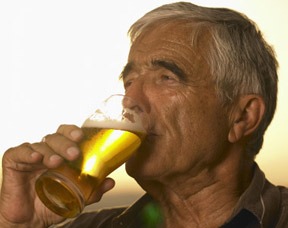When it comes to cancer, there appears to be no safe threshold when it comes to drinking alcohol. In the past it was only binge drinking that was seen as a contributing factor towards the elevated risk of developing cancer. However, this misconception was based primarily on flawed studies which only served to give a false sense of security. Alcohol has been known to cause breast cancer and at least seven types of cancers of the digestive system, including bowel cancer. According to a new study, drinking just one pint of beer every day can raise the risk of developing prostate cancer by as much as 23%.
The new collaborative study was done by researchers at the Centre for Addictions Research of BC at the University of Victoria and Australia’s National Drug Research Institute at Curtin University, and provides new evidence of a significant relationship between alcohol consumption and the risk of prostate cancer. The research team identified all previously published studies on alcohol and prostate cancer (340) and found 27 that attempted to measure the risk at different levels of consumption.
“This new study contributes to the strengthening evidence that alcohol consumption is a risk factor for prostate cancer. Alcohol’s contribution to prostate cancer will need to be factored into future estimates of the global burden of disease.”
-UVic’s CARBC director and co-author Dr. Tim Stockwell
Controlling for abstainer bias in their analysis of all 27 studies, they found a statistically significant dose-response relationship between amount of alcohol consumed and risk of prostate cancer among current drinkers. In other words, the more you drink, the greater your risk of prostate cancer. Even at low-volume drinking (up to two drinks per day), men had an 8% higher risk of developing prostate cancer in comparison to those who didn’t drink.
When the researchers examined only those six studies that were originally free of abstainer bias, the risk for low volume drinkers rose to 23%. Part of the problem with most previous studies comes from what scientists call “abstainer bias,” where former drinkers were lumped together with people who have never touched a drink. This practice can disguise the association between alcohol intake and health problems like prostate cancer by making drinkers “look good” in comparison with a group containing unhealthy former drinkers.
“For cancer risk, the causal processes appear to be operating whenever we drink, and to a degree directly relate to how much we consume and with no safe threshold. The risk was underestimated for years because many previous studies put former drinkers in the same category as teetotallers.”
-UVic’s CARBC director and co-author Dr. Tim Stockwell
“These findings highlight the need for better methods in research on alcohol and health,” said study co-author Dr. Tanya Chikritzhs. “Past and future studies that demonstrate protection from disease due to low-level drinking should be treated with caution.” You can find the full report in the online journal BMC Cancer.


